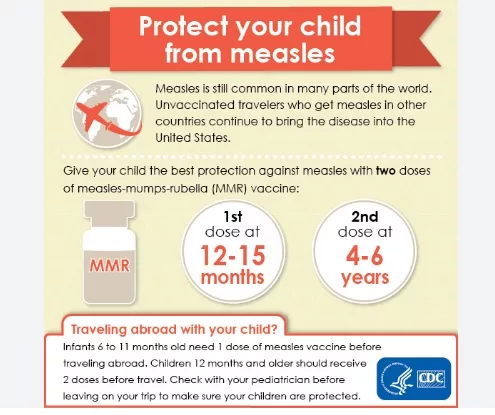
LEWISTON, ID — The Centers for Disease Control and Prevention has reported an increase in measles cases and outbreaks in the US and globally. All U.S. residents traveling internationally should be current on their MMR vaccinations regardless of destination. Idaho clinicians should ensure children are current on routine immunizations, including MMR.
Measles (rubeola) is highly contagious; one person infected with measles can infect nine out of ten unvaccinated individuals with whom they come in close contact. From January 1 to March 14, 2024, the CDC was notified of 58 confirmed U.S. cases of measles across 17 jurisdictions, compared to 58 total cases reported the entire year in 2023.
From Public Health Idaho North Central District:
Among the 58 cases reported in 2024, 54 (93%) were linked to international travel. Most cases reported in 2024 have been among children aged 12 months and older who had not received measles-mumps-rubella (MMR) vaccine. No confirmed measles infections have been reported to Idaho public health officials so far in 2024, however, 10 were reported in 2023.
Many popular travel destinations (Austria, the Philippines, Romania, and the United Kingdom) are experiencing measles outbreaks. The risk of widescale spread is low in most U.S. communities where population immunity is high; however, pockets of low MMR vaccination coverage leave some communities at higher risk for outbreaks.
Recommendations for Prevention
• Children who are not traveling internationally should receive their first dose of MMR at age 12 to 15 months and
their second dose at 4 to 6 years.
• All U.S. residents older than age 6 months without evidence of immunity who are planning to travel internationally
should receive MMR vaccine prior to departure.
- Infants aged 6 through 11 months should receive one dose of MMR vaccine before departure. Infants who receive a
dose of MMR vaccine before their first birthday should receive two more doses of MMR vaccine, the first of which
should be administered when the child is age 12 through 15 months and the second at least 28 days later. - Children aged 12 months or older should receive two doses of MMR vaccine, separated by at least 28 days.
- Teenagers and adults without evidence of measles immunity should receive two doses of MMR vaccine separated by at least 28 days.
• Evidence of measles immunity for international travelers is at least one of the following: 1) birth before 1957, 2) documented administration of two doses of live measles virus vaccine (MMR, MMRV, or other measles-containing vaccine), or 3) laboratory (serologic) proof of immunity (measles IgG) or laboratory confirmation of disease.

